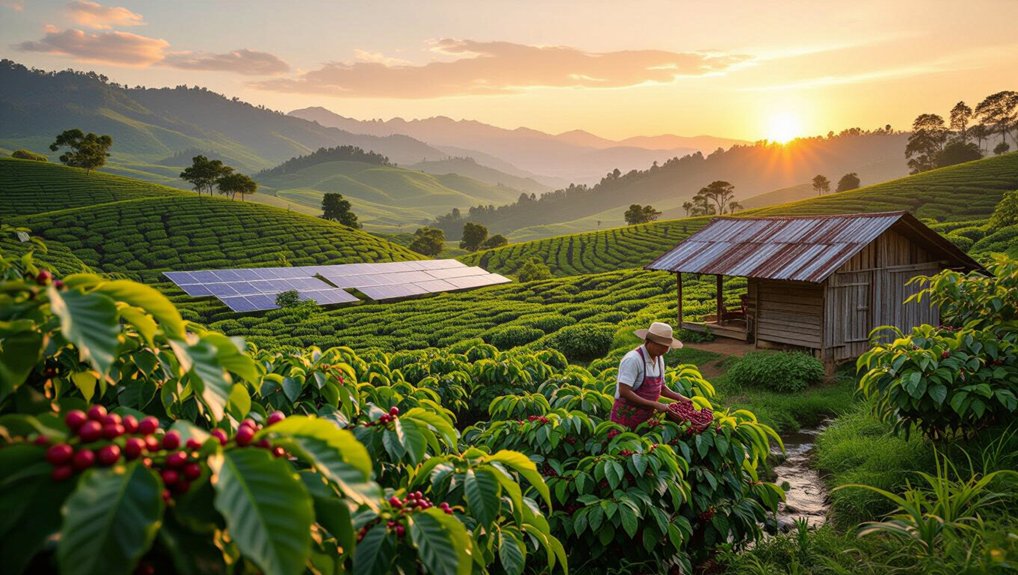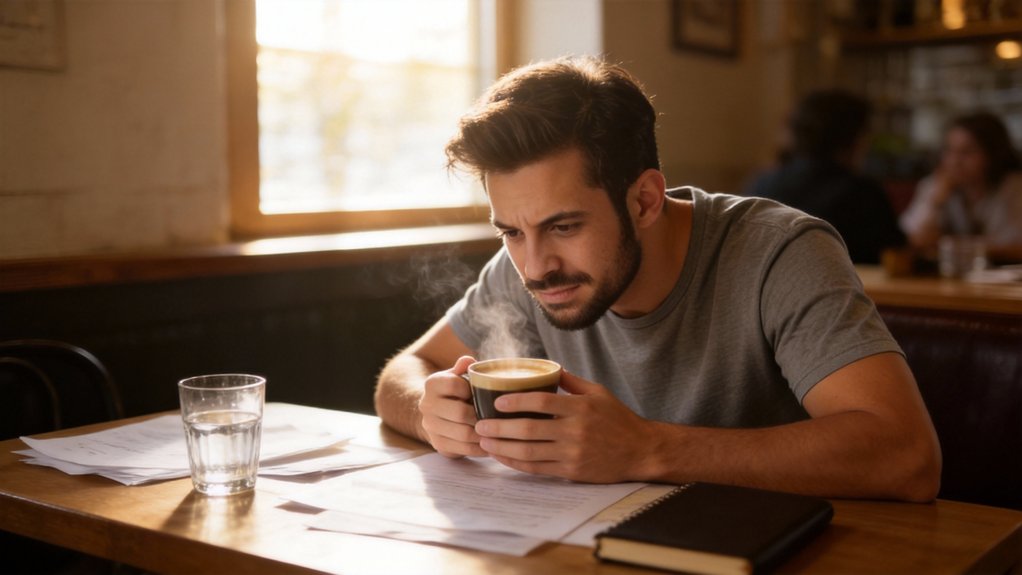Why Your Morning Coffee Matters More Than You Think
Do you know whether your daily coffee habit is helping or harming the environment? Many coffee lovers remain unaware that their purchasing decisions directly impact rainforest preservation, wildlife habitats, and farming communities worldwide. The truth is, conventional coffee production often contributes to deforestation, water pollution, and habitat destruction.
This post will explore the sustainable coffee practices that are transforming the industry and protecting our planet. You’ll discover how shade-grown cultivation preserves biodiversity, why organic farming methods matter for ecosystem health, and which certifications to look for when shopping for environmentally responsible coffee.
By the end, you’ll understand exactly how to make coffee choices that support both exceptional flavor and environmental conservation – turning your morning ritual into a powerful force for positive change.
Table of Contents
Understanding the Environmental Impact of Coffee Production
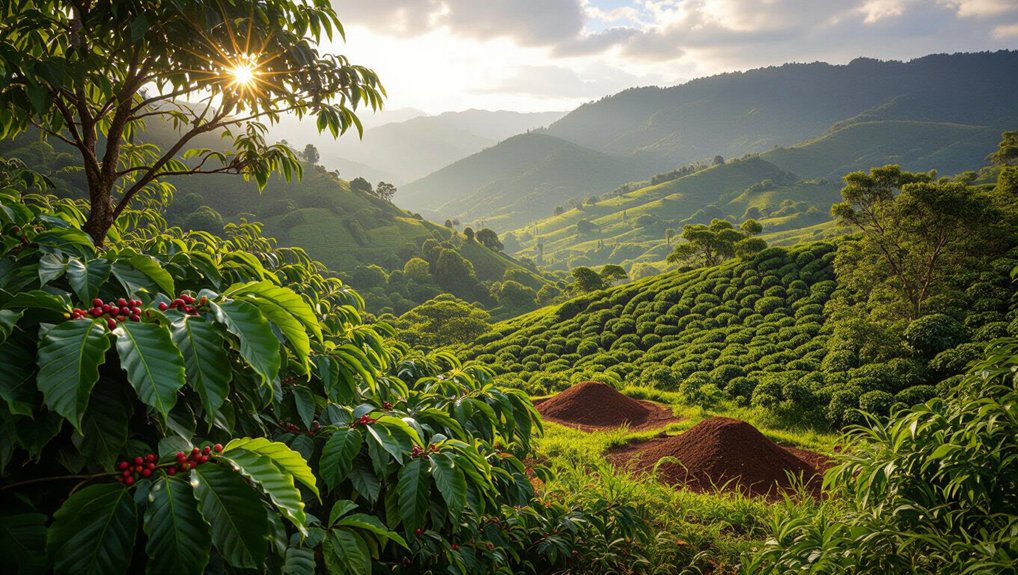
While coffee is a beloved morning ritual for millions, its production carries a substantial environmental footprint that many consumers rarely consider.
Sustainable farming practices are crucial in addressing coffee production’s devastating ecological impacts. Deforestation claims 2.5 million acres annually, destroying habitats and accelerating climate change. Traditional methods involving chemical fertilizers compromise soil health and water quality, threatening local ecosystems.
Key Sustainable Farming Practices for Coffee Growers
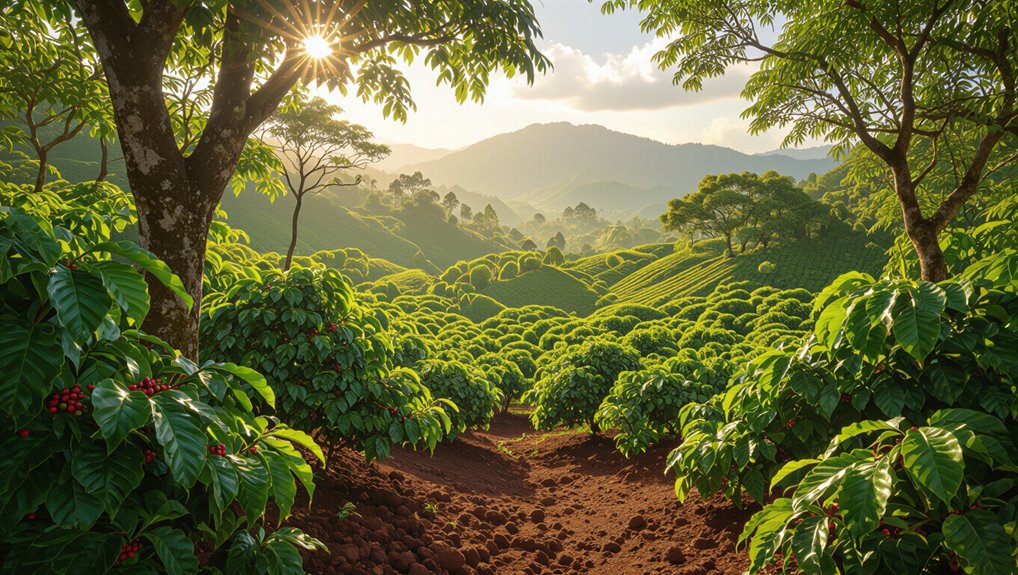
Given coffee’s complex environmental challenges, farmers worldwide are pioneering sustainable farming practices that protect both crop quality and ecological systems.
Shade-grown coffee cultivation preserves biodiversity by maintaining tree cover, while agroforestry practices enhance soil health.
I’ve seen how integrated pest management reduces chemical pesticide use, and organic fertilizers foster healthier ecosystems.
Water management techniques like drip irrigation help coffee-growing regions conserve precious resources.
Certifications and Standards in Eco-Friendly Coffee
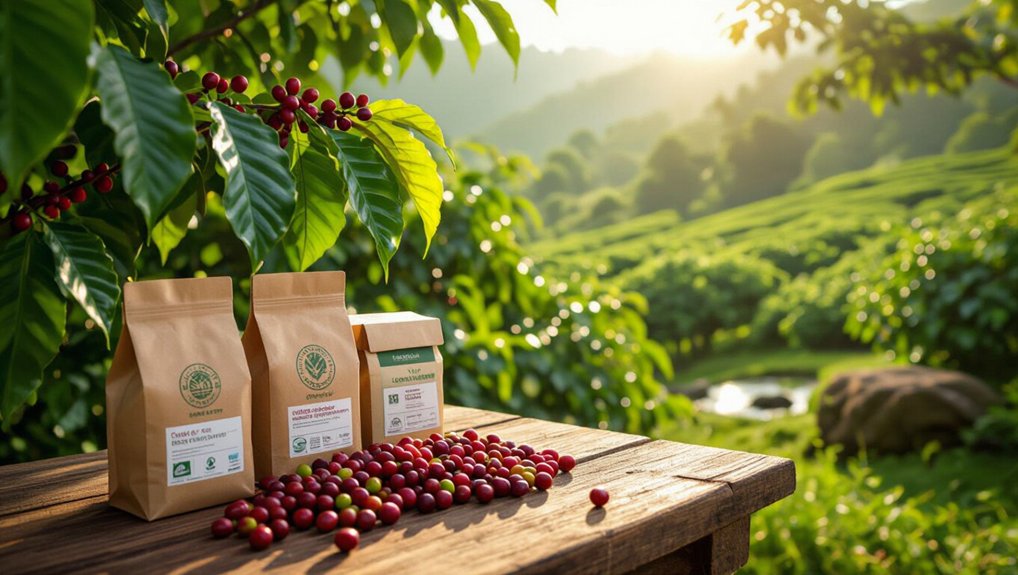
As coffee consumers become more environmentally conscious, certifications have emerged as powerful tools for ensuring sustainable and ethical coffee production.
These standards help protect both farmers and ecosystems while delivering high-quality beans. You’ll discover certifications that make a real difference:
- Fair Trade ensures farmers receive fair prices, supporting their livelihoods
- USDA Organic promotes chemical-free farming and soil health
- Rainforest Alliance champions biodiversity conservation and climate-smart agriculture
When you choose certified coffee, you’re not just buying a drink-you’re supporting eco-friendly practices that transform entire communities and protect our planet’s delicate agricultural landscapes.
The Role of Farmers in Environmental Conservation
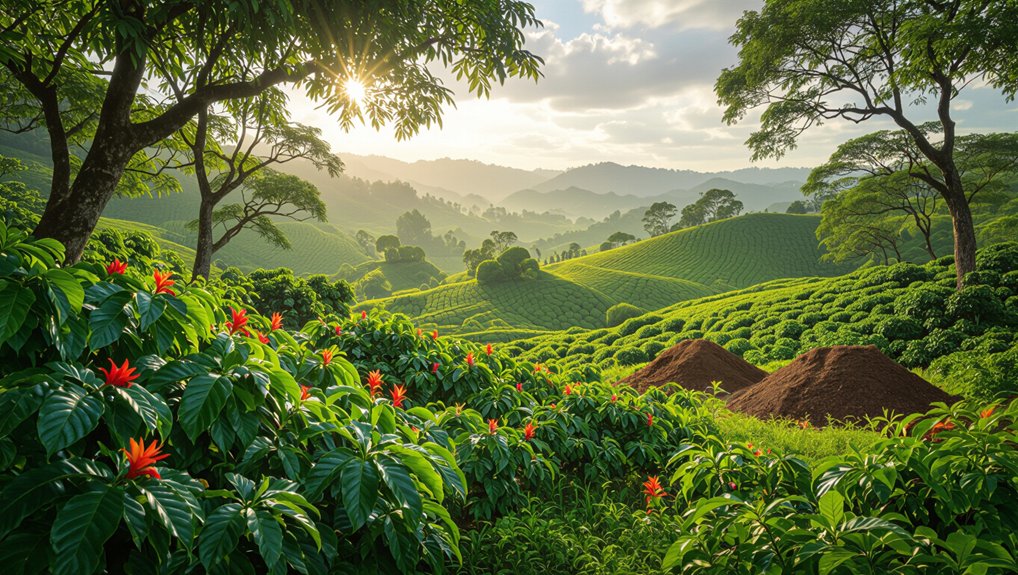
Coffee farmers are the unsung heroes of environmental conservation, wielding powerful practices that protect our planet’s delicate ecosystems.
Through sustainable farming techniques like agroforestry and organic methods, they’re preserving biodiversity and improving soil health. Fair wages incentivize farmers to maintain environmentally friendly practices, preventing deforestation and soil degradation.
Economic and Social Benefits of Sustainable Coffee
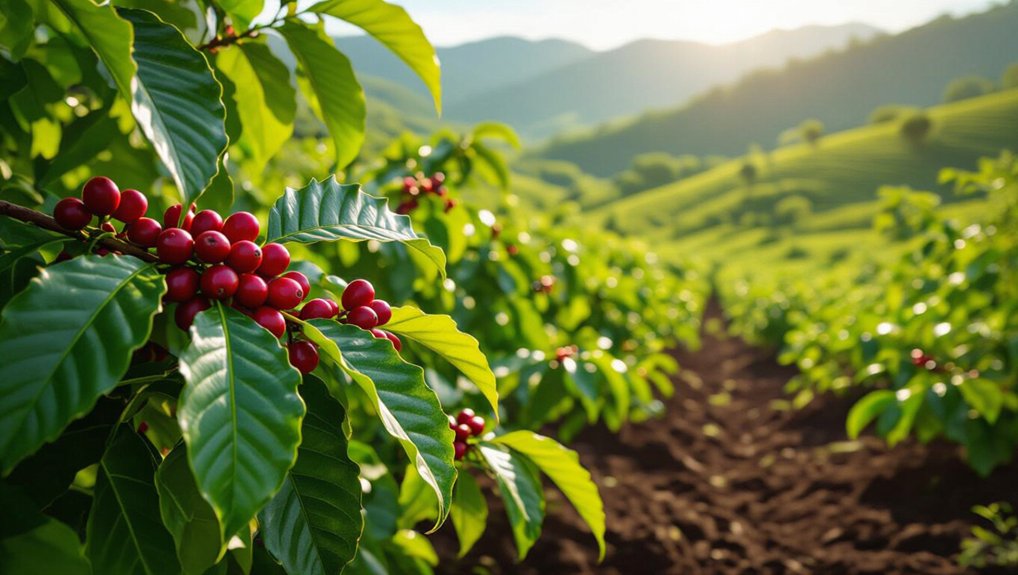
When you explore sustainable coffee practices, you’ll quickly discover they’re about much more than environmental preservation-they’re a powerful economic and social transformation tool for coffee-growing communities.
Sustainable farming and Fair Trade practices offer incredible benefits:
- Price premiums empower local communities to reinvest in infrastructure
- Reduced economic vulnerability through diversified income opportunities
- Enhanced skills training that supports environmental health
How Consumers Can Support Sustainable Coffee Initiatives
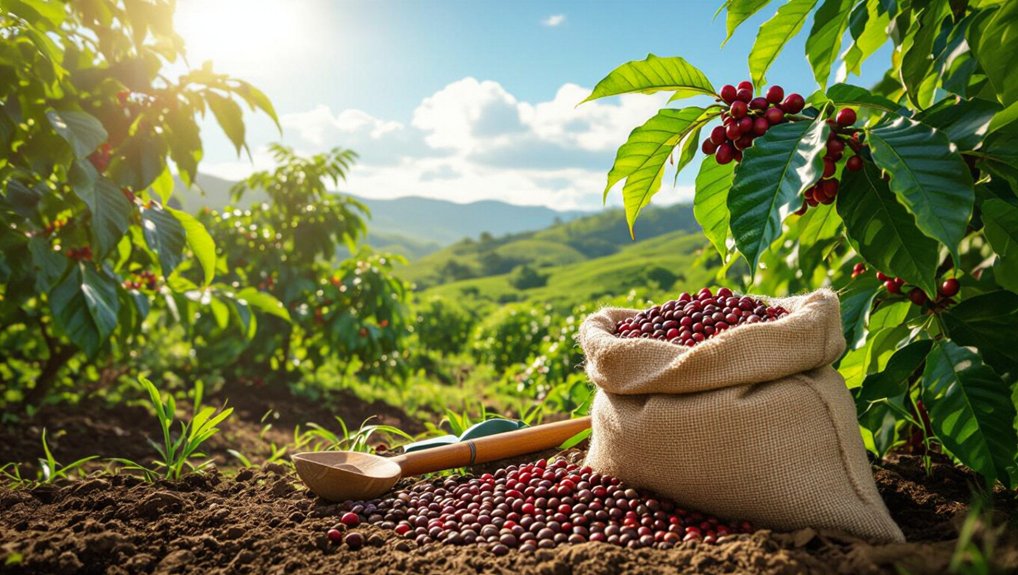
Supporting sustainable coffee isn’t just a lofty ideal-it’s a tangible way for every coffee lover to make a real difference.
By choosing Fair Trade and organic certifications, you’ll reduce environmental impact and support ethical practices.
Opt for shade-grown beans to preserve biodiversity, and select local roasters to minimize carbon footprint.
Embrace black coffee to cut emissions, and always carry a reusable cup to reduce waste.
These simple choices transform your daily brew from a routine indulgence into a powerful statement of environmental responsibility and global stewardship.
Frequently Asked Questions
What Is the Most Environmentally Friendly Coffee Method?
I believe shade-grown coffee is the most environmentally friendly method, as it preserves forest ecosystems, supports native trees, and enhances biodiversity while allowing coffee plants to thrive naturally alongside existing woodland environments.
What Are the Sustainable Coffee Growing Practices?
I’ve discovered sustainable coffee growing practices include shade cultivation, organic farming, agroforestry systems, water conservation techniques, and natural pest control methods that protect biodiversity, enhance soil health, and minimize environmental impact.
What Is the Most Environmentally Friendly Coffee?
I believe shade-grown, organic, and Fair Trade certified coffee is the most environmentally friendly. By preserving forests, avoiding chemicals, and supporting sustainable farming, these coffees protect ecosystems while delivering a delicious, planet-conscious brew.
Is Coffee Sustainable for the Environment?
Coffee isn’t inherently sustainable, but I can help. By choosing shade-grown, organic, and certified beans, you’ll support environmentally friendly practices that reduce deforestation, protect biodiversity, and minimize harmful chemical impacts on ecosystems.
In Conclusion
I’m committed to making a difference with every cup I brew. By choosing sustainable coffee, you’re not just enjoying a delicious drink-you’re supporting global ecosystems, empowering farmers, and protecting our planet. Every purchase is a vote for environmental conservation. Small choices matter, and together, we can transform the coffee industry into a force for positive change. Let’s brew a better future, one sustainable sip at a time.

